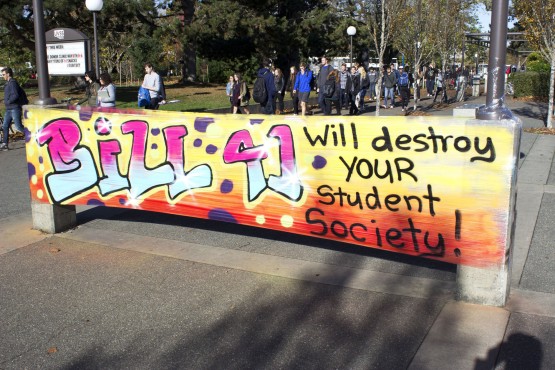
In the time since this banner was put up in early November, it still isn’t clear what effect Bill 41 will have on student societies. Photo by Myles Sauer
In May of 2015, the B.C. legislature culminated a five-year process of revamping the B.C. Societies Act by passing a new version of the legislation. The new act made significant changes to a student’s ability to opt-out of their student society fees at universities around the province.
The UVSS saw the new act as a threat to their social enterprise, according to Director of External Relations Kenya Rogers. In response, the UVSS banded together with student societies from around the province, hired a lawyer, and started to lobby the government.
In response to the concerns raised by student societies, the B.C. legislature added amendments as part of a new bill: the Miscellaneous Statutes Amendment Act, or Bill 41. These amendments focused on breaking society fees into a dual-streamed fee structure: “capital fees” and “program or service fees.”
By dividing student fees into two areas, it allows students to opt-out of some (program or service fees) but not others (capital fees). This would guarantee a student society’s source of revenue, while still allowing students to opt-out of services they may not benefit from, or want to support. On Nov. 20, Bill 41 was passed into law.
[For more on Bill 41, read our initial report from Nov. 5.]
The Ministry of Advanced Education has been tasked with classifying fees within each student society. In an interview on Nov. 17, Communications Director Rodney Porter said that the ministry had met with student societies for months via email and telephone. “The [consultation] process also included a question and answer period [with student societies],” he added.
According to Porter, program or services fees would support things like advocacy groups or the Martlet newspaper. Capital fees would go towards building maintenance and renovations.
“After speaking with student associations about how they wanted to be consulted and provide input, the ministry felt the best approach for an initial consultation was through written submissions,” Porter said. On Nov. 9, the ministry asked B.C. student societies to supply them with a list of the types of fees being charged to students. It is now up to the ministry to categorize the fees as either capital fees or program and service fees. Porter said that student societies had until Nov. 23 to supply feedback to the ministry.
Rogers said they are currently in a state of wait and see. “We have sent our fee structure as well as any collected feedback to the ministry. We don’t really know what fees will be affected,” she said. “We have had no verbal communication with them since the bill was passed.”
Porter said that they are still waiting on a number of student societies to respond before setting any firm timeline; however, he did say they hope to have fees classified by early 2016.
Rogers and UVSS Chairperson Bronté Renwick-Shields said that despite the bill being passed into law, the UVSS will still lobby the government. The pair also said that the UVSS has not yet taken steps to prepare for the changes Bill 41 will impose.
“They are focussing their efforts on fighting the bill,” said Kevin Tupper, a third-year economics student, in an email interview. “Ultimately, this is in the hands of the legislators, so I urge the UVSS to begin preparing solutions for how they need to react should this bill come into effect.” When Tupper raised these concerns at the UVSS’s Oct. 28 AGM, he said the UVSS was unable to provide him with a satisfactory answer.
“In 2012, the UVSS received 42 per cent of their total revenue from student fees. Today, they receive over 50 per cent of their total revenue from student fees,” said Tupper. “If fees become optional, it would force the UVSS to adopt more responsible financial practices.”
[Editor’s note: Since this article’s publication, UVSS General Manager Dale Robertson has clarified that at year’s end April 2012, membership fees made up a total of 44.2 per cent of the UVSS’s revenue; in the year ending April 2015, membership fees made up a total of 43.9 per cent.]
Rogers and Renwick-Shields believe that the UVSS’s purpose is to provide a social enterprise to its members, and to provide resources that would otherwise not be available, such as the advocacy groups, the Martlet, and the Food Bank. But they don’t believe in increasing profitability at businesses like Felicita’s, ZAP Copy, or SUBText to help support the above mentioned resources.
“We like to pay our students a good wage and we like to hire a lot of people,” said Rogers. She also said that increasing profitability at their businesses would mean paying student employees less, and hiring fewer of them. “Part of our businesses is providing low-cost food, healthy food to students, and good student jobs that are well paid,” Rogers said.
Rogers does not foresee the SUB becoming an exclusive place for only the students who have paid full student fees. “It would go against the values and things that we believe in,” she said.
Tupper agreed, saying that while restricting access would create an incentive for more students to pay the full fee, it would also shrink the customer base of the UVSS businesses.
The ministry has made it clear that some fees will become optional, but until they release a formal designation of fees in the new year, the magnitude of fee changes will remain uncertain.
As of Monday, Dec. 7, Rogers said she has still not heard anything back from the Ministry of Advanced Education.







